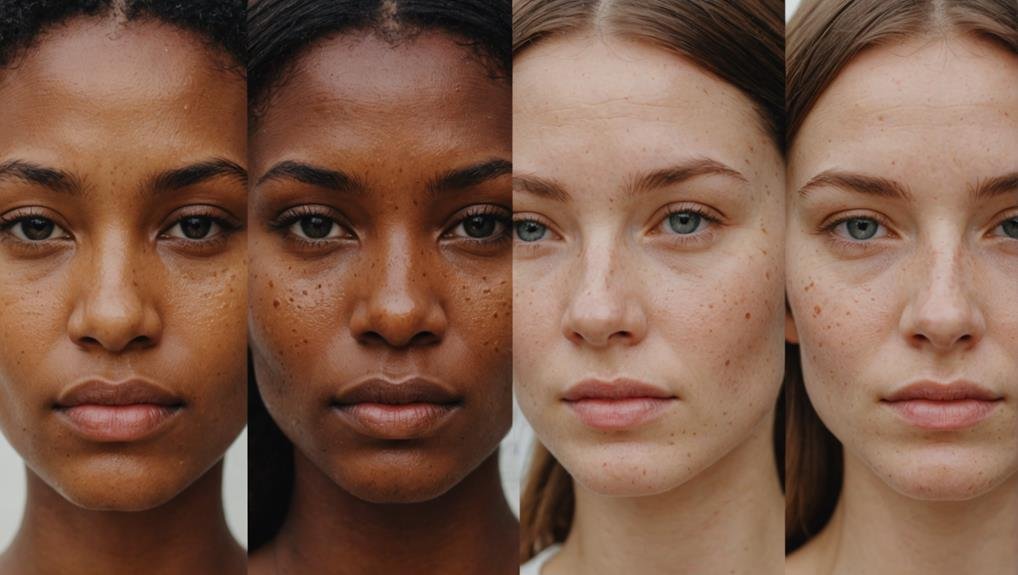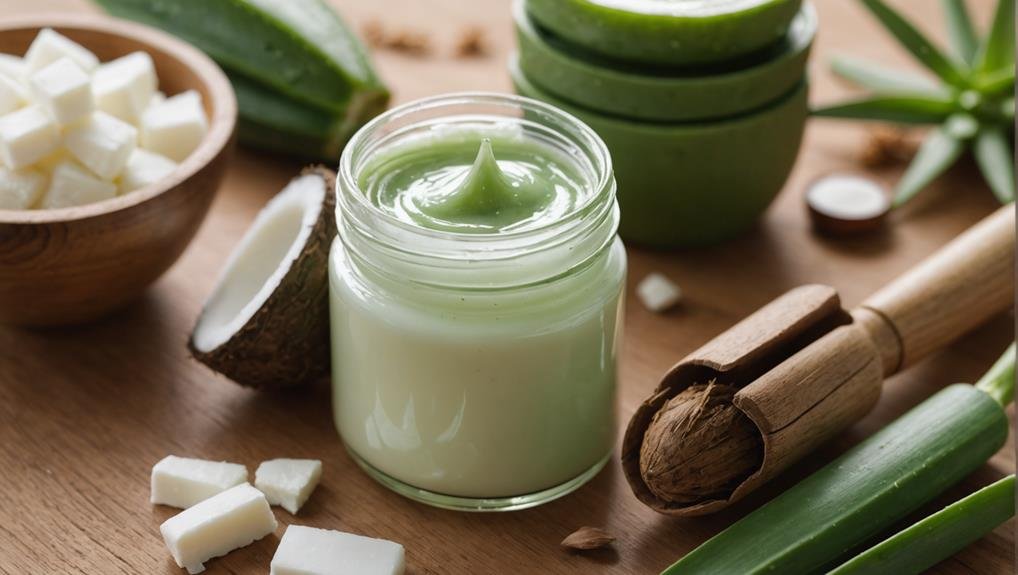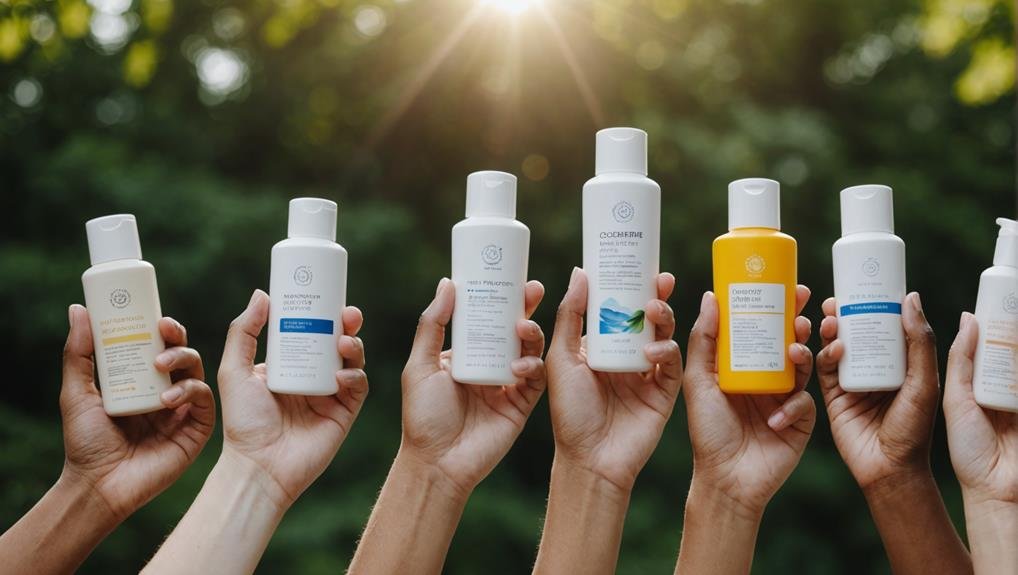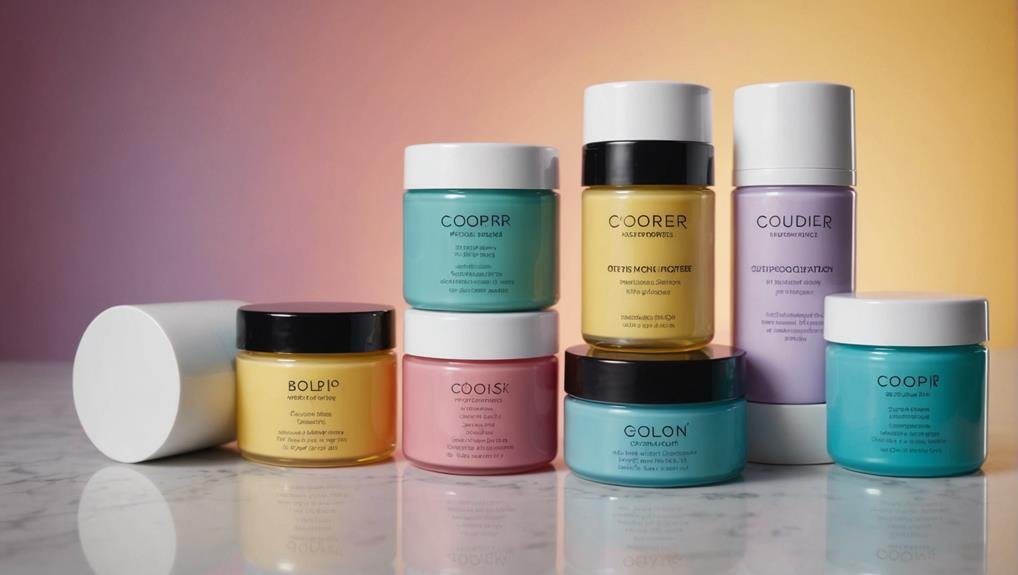"Cherishing Little Steps - A Haven for Baby and Family Journeys"
Choosing the Right Moisturizer for Your Skin Type#COMMA
When it comes to choosing the right moisturizer for your skin type, did you know that 60% of people struggle to find the perfect match for their skin concerns? Understanding your skin's unique needs and concerns is crucial in selecting a moisturizer that will work effectively for you. By considering factors like your skin type, specific issues you want to address, and the ingredients that will benefit your skin the most, you can ensure that your skincare routine is tailored to provide optimal results. So, how can you navigate the vast array of options available and find the ideal moisturizer for your skin?
Key Takeaways
- Determine skin type and concerns before selecting a moisturizer.
- Look for ingredients like hyaluronic acid or ceramides tailored to your skin's needs.
- Consider non-comedogenic formulas to prevent breakouts.
- Choose a texture (gel, lotion, cream) suitable for your skin type.
Determine Your Skin Type

To determine your skin type accurately, perform a simple at-home test or consult a dermatologist for a professional evaluation. Understanding your skin type is crucial for effective skincare.
Start by analyzing how your skin feels throughout the day. Oily skin often feels greasy, especially in the T-zone, while dry skin may feel tight and rough. Combination skin can have both oily and dry areas. Normal skin feels balanced and not overly oily or dry. Pay attention to how your skin reacts to different products to assess compatibility.
Hydration levels are essential in determining skin type. Dry skin lacks moisture and may have flakiness and dullness. Oily skin tends to be shiny and may have enlarged pores. Combination skin can exhibit characteristics of both dry and oily skin.
Consider your skin concerns, such as acne, sensitivity, or aging signs, when analyzing your skin type. Identifying your skin type will guide you in choosing the right moisturizer to address your specific needs effectively.
Understand Your Skin's Needs
Understanding your skin's needs is crucial for creating an effective skincare routine tailored to your specific concerns and goals. Skin hydration is essential for maintaining healthy skin, especially during seasonal changes when the weather can impact moisture levels.
To address this, consider adjusting your moisturizing techniques according to the time of year. In colder months, opt for richer, more emollient creams to combat dryness, while lighter lotions may suffice in warmer weather.
It's important to debunk common skincare myths that could hinder your skin's health. For instance, the misconception that oily skin doesn't need moisturizer can lead to dehydration and increased oil production. Every skin type benefits from proper hydration.
Additionally, understanding your skin's needs goes beyond just moisturizing. Factors like age, lifestyle, and environmental exposure play a role in determining the right products for you.
Consider Your Skin Concerns

Consider your skin concerns when selecting the right moisturizer to address specific issues and achieve optimal skin health. Understanding your skin conditions and goals is crucial in determining the most suitable product for your skincare routine.
Different skin concerns require specific ingredients to target them effectively. It's essential to ensure ingredient compatibility with your skin type to maximize the benefits of your moisturizer.
When choosing a moisturizer, focus on product efficacy to address your skin concerns. Whether you're dealing with dryness, oiliness, acne, sensitivity, or aging, selecting a moisturizer tailored to your specific needs can make a significant difference in improving your skin's overall health.
Take into account your skin goals, whether it's hydration, anti-aging, brightening, or calming irritated skin, and look for products that align with these objectives.
Choose the Right Ingredients
Selecting the appropriate moisturizer for your skin type involves choosing products with the right ingredients tailored to address your specific skincare needs. When considering the ingredients in a moisturizer, it's crucial to think about ingredient compatibility with your skin type. Some ingredients may work wonders for one person but could cause skin reactions in another.
Understanding your skin sensitivities can help in selecting the most suitable moisturizer.
To ensure the effectiveness of your moisturizer, look for ingredients like hyaluronic acid for hydration, niacinamide for brightening, or ceramides for restoring the skin barrier. These ingredients can target specific skin concerns while being gentle on the skin.
If you have sensitive skin, opt for products with soothing ingredients like aloe vera or chamomile to prevent any adverse skin reactions. Checking for potential allergens or irritants in the ingredient list is also essential to avoid exacerbating any skin sensitivities.
Avoid Harsh Chemicals

When choosing a moisturizer for your skin type, it's essential to steer clear of harsh chemicals that can potentially irritate or damage your skin. Harsh chemicals like parabens, sulfates, and synthetic fragrances may lead to skin sensitivities, breakouts, or long-term damage.
Opting for natural alternatives and organic products can be a safer choice for your skin's health and overall well-being.
Natural alternatives, such as plant-based oils like jojoba, argan, or coconut oil, can provide hydration without the risk of harmful side effects. These ingredients are rich in vitamins and antioxidants that nourish and protect the skin.
Organic products, which are free from pesticides and other harmful chemicals, are a gentler option for sensitive skin types. Look for certifications like USDA Organic or COSMOS Organic to ensure the product meets strict organic standards.
Test Patch New Products
Before introducing a new moisturizer to your skincare routine, it's crucial to conduct a patch test to assess any potential adverse reactions. To perform a sensitivity check, apply a small amount of the product on a discreet area of your skin, like the inner forearm. Allow it to sit for 24 hours, observing for any signs of irritation, redness, or itching. This step is essential in preventing a full-face application that could lead to adverse effects.
During the reaction observation period, avoid applying any other new products to the test area to accurately pinpoint the source of any negative skin responses. If you experience any discomfort or adverse reactions during the 24-hour period, it's best to refrain from using the product on your face.
Opt for Non-Comedogenic Formulas

Consider choosing moisturizers labeled as non-comedogenic to help prevent clogged pores and potential breakouts. Non-comedogenic formulas are specifically designed to minimize pore-clogging potential, making them ideal for individuals with skin sensitivity prone to acne or breakouts. These products are formulated to be lighter and less likely to block pores, reducing the risk of aggravating existing skin conditions.
Opting for non-comedogenic moisturizers is particularly beneficial for those with oily or combination skin. These formulas are usually oil-free, meaning they won't add excess oil to your skin, helping to maintain a healthy hydration balance without exacerbating greasiness.
By choosing non-comedogenic options, you can ensure that your skin receives the necessary moisture without the fear of causing unwanted breakouts.
When selecting a moisturizer, especially if you have skin sensitivity, consider looking for the non-comedogenic label on the packaging. This simple step can make a significant difference in maintaining clear and balanced skin.
Select the Right Texture
To ensure your moisturizer effectively caters to your skin's needs, pay attention to selecting the right texture that suits your skin type. Texture preferences play a significant role in how your skin responds to a moisturizer. For oily or acne-prone skin, lightweight, gel-based textures are often preferred as they are less likely to clog pores. On the other hand, dry or mature skin may benefit from richer, creamier textures that provide intense hydration.
Skin conditions such as eczema or rosacea can also influence the best texture for your moisturizer. For sensitive skin, opting for gentle, fragrance-free lotions or creams can help prevent irritation. Seasonal changes and hydration levels should also be considered when choosing a texture. In drier months, a heavier texture may be necessary to combat moisture loss, while a lighter texture can suffice during humid weather. By understanding your skin type, conditions, and the impact of seasons on hydration levels, you can select a moisturizer with the perfect texture to keep your skin healthy and glowing.
| Texture Type | Skin Type | Best Suited For |
|---|---|---|
| Lightweight Gel | Oily, Acne-Prone | Preventing Clogged Pores |
| Rich Cream | Dry, Mature | Providing Intense Hydration |
| Fragrance-Free | Sensitive | Preventing Irritation |
Factor in Sun Protection

When selecting a moisturizer, it's crucial to factor in sun protection to safeguard your skin from harmful UV rays.
Layering products is essential to ensure adequate sun protection, and incorporating a moisturizer with SPF into your daily skincare routine can offer a convenient way to achieve this.
The importance of daily application of a moisturizer with sun protection can't be overstated.
Not only does it hydrate your skin, but it also acts as a barrier against the damaging effects of the sun.
Consult With a Dermatologist
Engage a dermatologist to determine the most suitable moisturizer for your skin type based on their expert assessment and recommendations.
A dermatologist can conduct a thorough skin analysis to understand your specific skin concerns, such as dryness, oiliness, sensitivity, or acne. Through this analysis, they can recommend a moisturizer tailored to address your unique needs effectively.
Seeking professional advice is crucial, as dermatologists have in-depth knowledge of various skin types and conditions. They can recommend specific ingredients to look for or avoid in a moisturizer based on your skin analysis.
Additionally, they can suggest whether you need a lightweight, oil-free formula or a richer moisturizer for optimal hydration.
Budget-Friendly Options

Consider exploring budget-friendly moisturizer options that cater to your skin type without compromising on quality or effectiveness. When looking for affordable skincare solutions, drugstore brands can offer a wide range of moisturizers suitable for different skin types. These products are often formulated with beneficial ingredients like hyaluronic acid, glycerin, and ceramides to help hydrate and nourish your skin without breaking the bank.
If you prefer a more natural approach, DIY options using simple household ingredients can also be effective. Natural remedies such as aloe vera gel, coconut oil, or shea butter can provide moisturizing benefits while being gentle on the skin. Homemade recipes like oatmeal masks or honey-infused moisturizers are easy to make and can be tailored to address specific skin concerns.
Customize Your Skincare Routine
To tailor your skincare routine effectively, assess your skin type and specific concerns before selecting the appropriate products. Understanding your skin's unique needs is crucial in customizing a regimen that will address your concerns and promote a healthy complexion. Begin by determining whether your skin is oily, dry, combination, or sensitive, as this will guide you in selecting the right products.
Product recommendations should align with your skin type and concerns. For instance, those with dry skin may benefit from a rich moisturizer containing ingredients like hyaluronic acid or ceramides to boost hydration levels. On the other hand, individuals with oily skin should opt for lightweight, oil-free formulas to prevent clogged pores and excess shine.
When customizing your skincare regimen, consider an ingredient analysis to ensure you're using products that target your specific needs. Additionally, maintaining optimal hydration levels is essential for healthy skin, so incorporating hydrating serums or masks can further enhance your routine.
Frequently Asked Questions
Can I Use the Same Moisturizer for Day and Night?
You should consider using a different moisturizer for day and night. Day moisturizers are lighter for under makeup, while night creams are richer and work on repair. The consistency and texture vary to suit your skin's needs throughout the day and night.
How Often Should I Change My Moisturizer?
You might think changing moisturizers often is the key to perfect skin, but don't rush it. Stick to your skincare routine, adjusting as needed for seasonal changes, skin concerns, and ingredient preferences.
Is It Necessary to Apply Moisturizer on My Neck and Chest?
Yes, it is essential to apply moisturizer on your neck and chest for optimal skin hydration. This routine helps maintain the health of these areas, preventing dryness and promoting skin elasticity. Moisturizer benefits extend beyond the face.
Can I Mix Different Moisturizers for Better Results?
Mixing different moisturizers can be like creating a skincare cocktail. While it might seem fun, it's best to avoid this mixology. Layering products strategically in your routine ensures each works effectively without potential drawbacks.
Should I Apply Moisturizer Before or After Sunscreen?
Applying sunscreen before moisturizer ensures adequate protection from UV rays. Sunscreen application shields your skin from damage, while hydrating with moisturizer afterward locks in moisture and maintains skin health. This order maximizes benefits for your skin.
Conclusion
Now that you have a better understanding of your skin type and its specific needs, choosing the right moisturizer should be a breeze.
Remember to consider ingredients that work well with your skin, address your concerns, and provide sun protection.
While focusing on effective products, also be mindful of avoiding harsh chemicals.
By following these steps and consulting with a dermatologist if needed, you can customize your skincare routine for a healthier and more radiant complexion.




